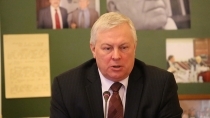Ru
|
Eng
Opinion: Belarusian specialists can help build nuclear power plants abroad
28.07.2020

Belarusian specialists, who are now employed at the construction site of the Belarusian nuclear power plant, can help build nuclear power plants abroad. The statement was made by Mikhail Lysenko, Assistant Professor of the International Law Department of the Russian institute MGIMO, during the online conference held on 22 July to discuss benefits and prospects of peaceful uses of nuclear energy in Belarus.
“Excellent joint [Belarusian-Russian] teams of workers, engineers, and scientists have been formed in the course of building the Belarusian nuclear power plant. I am convinced that the joint crews could be in demand at foreign nuclear power plant construction sites. At present Rosatom is building 25 facilities in ten countries,” Mikhail Lysenko noted.
According to the expert, the scientific community is interested in Belarusian and Russian competences for the sake of creating movable power plants. “The future of the planet’s nuclear energy industry belongs to compact sources of energy, including movable nuclear power plants. The world’s first floating nuclear power plant, which is located in the Chukotka Peninsula, is an example,” he noted.
Mikhail Lysenko believes that the scientific potential of Russian institutes and the energy and nuclear research institute Sosny of the National Academy of Sciences of Belarus will be in demand in small-scale power generation. It was in this Belarusian institute that the first movable small-scale nuclear power plant had been created in the 1980s. Many countries and regions need mobile sources of energy like that, the assistant professor noted.
Mikhail Lysenko also reminded that Russia and Belarus are considering setting up a nuclear research and technology center based on a multipurpose nuclear research reactor. “Such a center will handle many tasks, but first of all it will contribute to the safe operation of the Belarusian nuclear power plant. Apart from that, this research institution can be used to train personnel, produce medical radioisotopes, and improve radiation monitoring methods. As we can see, there is potential for bilateral cooperation and for replicating the project abroad,” Mikhail Lysenko said.
Photo courtesy of pircenter.org
“Excellent joint [Belarusian-Russian] teams of workers, engineers, and scientists have been formed in the course of building the Belarusian nuclear power plant. I am convinced that the joint crews could be in demand at foreign nuclear power plant construction sites. At present Rosatom is building 25 facilities in ten countries,” Mikhail Lysenko noted.
According to the expert, the scientific community is interested in Belarusian and Russian competences for the sake of creating movable power plants. “The future of the planet’s nuclear energy industry belongs to compact sources of energy, including movable nuclear power plants. The world’s first floating nuclear power plant, which is located in the Chukotka Peninsula, is an example,” he noted.
Mikhail Lysenko believes that the scientific potential of Russian institutes and the energy and nuclear research institute Sosny of the National Academy of Sciences of Belarus will be in demand in small-scale power generation. It was in this Belarusian institute that the first movable small-scale nuclear power plant had been created in the 1980s. Many countries and regions need mobile sources of energy like that, the assistant professor noted.
Mikhail Lysenko also reminded that Russia and Belarus are considering setting up a nuclear research and technology center based on a multipurpose nuclear research reactor. “Such a center will handle many tasks, but first of all it will contribute to the safe operation of the Belarusian nuclear power plant. Apart from that, this research institution can be used to train personnel, produce medical radioisotopes, and improve radiation monitoring methods. As we can see, there is potential for bilateral cooperation and for replicating the project abroad,” Mikhail Lysenko said.
Photo courtesy of pircenter.org
ANALYTICS
30.08.2023
21.03.2023
30.08.2021
02.07.2021
23.06.2021
10.06.2021
04.06.2021
03.06.2021
20.05.2021
15.05.2021













